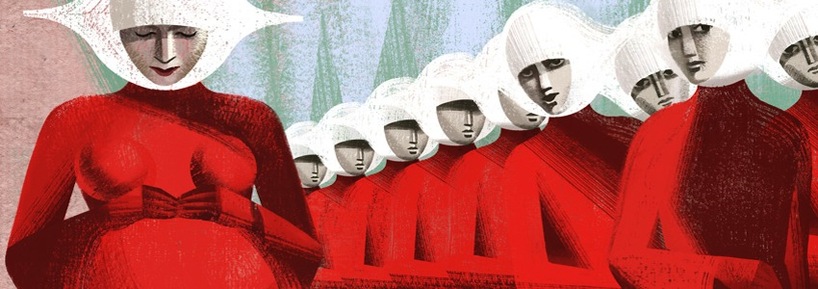Wednesday, February 20, 2013
Significant quotation from The Handmaid's Tale
"I wait, I compose myself. Myself is a thing I must now compose, as one composes a speech. What I must present is a made thing, not something born." The quotation above symbolizes Offred's thoughts just before she participates in the ceremony. The quotation expresses the thought of a speech being more for a public audience and displaying the best things about one self, rather than Offred expressing how she truly feels about society. "A thing made is created for a purpose" demonstrates Offred's place in the society she lives in. She is descibed as a character with heroic qualities because of her internal rebellion. The only place where Offred is able to be completely free is inside her head, her outer self is artificial meaning she must act as society does. Even in Offred's thoughts her sense of judgement is emphasized. She appears to be self conscious about her thoughts because of what she knows and the way she was raised. Offred's earliest memories are of her aunt teaching her to be a hanmaid. It would be easier for Offred to accept that her current setting is a comfortable lifestyle, but Offred is not made that way.

Monday, February 18, 2013
Chapters 5-8 of The Handmaid's Tale
Select one quote from the selection that you feel is significant.
"Ordinary, said Aunt Lydia, is what you are used to. This may not seem ordinary to you now, but after a time it will. It will become ordinary." This quotation found in chapter 6 of The Handmaid's Tale describes the way that Offred is feeling from seeing the bodies that have been hung. She appears to be okay and capable of dealing with the situation, but in reality Offred is terrified of what she has just witnessed. The quotation also suggests the remembrance of Aunt Lydia and how she believed that Gilead will someday become normal. Lydia's words are used to symbolize the idea of over looking truly horrifying circumstances and making them seem normal. Within the quotation there is an emphasis in which the town of Gilead prevails by letting the towns folk not think or even acknowledge what a different world would be like. The fact that Lydia expects for their current society to seem ordinary is a hyperbole. Attempting to make such drastic situations accepted as a common/ordinary lifestyle is an extreme.

"Ordinary, said Aunt Lydia, is what you are used to. This may not seem ordinary to you now, but after a time it will. It will become ordinary." This quotation found in chapter 6 of The Handmaid's Tale describes the way that Offred is feeling from seeing the bodies that have been hung. She appears to be okay and capable of dealing with the situation, but in reality Offred is terrified of what she has just witnessed. The quotation also suggests the remembrance of Aunt Lydia and how she believed that Gilead will someday become normal. Lydia's words are used to symbolize the idea of over looking truly horrifying circumstances and making them seem normal. Within the quotation there is an emphasis in which the town of Gilead prevails by letting the towns folk not think or even acknowledge what a different world would be like. The fact that Lydia expects for their current society to seem ordinary is a hyperbole. Attempting to make such drastic situations accepted as a common/ordinary lifestyle is an extreme.

Friday, February 1, 2013
Significant quotation from The Handmaid's Tale
"We learned to lip-read our heads flat on the beds turned sideways, watching each others mouths. In this way we exchanged names from bed to bed". The previous quotation represents the theme of women being used as political instruments. A theme is the universal idea described in a literary work. This quotation describes how trapped the narrator and her friends feel within society. They are prohibited from speaking at all and even using their real names. In this time period women cannot vote, or do anything that could possibly make them individuals they have absolutely no say when dealing with making choices. In spite of all of their restrictions, they find ways in order to rebel/bend the rules and reveal their names. This act of doing definitely emphasizes the importance they feel for their identities. In The Handmaid's Tale there is obviously a notable abscence of real names/individuality in the book which suggests why the narrator will try to protect the people she loves.

Examples of Principal Taxation (Economics)
Adequacy taxes should be just enough to generate revenue required
for provision of essential public services and broad basing taxes, should be
spread as wide as possible section of the population. There are two types of taxation direct and
indirect. Those who benefit from
services should be the ones who pay for them.
People should pay taxes in proportion to the amount of services or
benefits they receive. Taxation is a payment
levied by government for which no good or service is received directly in
return. The amount of tax people pay is
not related directly to the benefit people obtain from the provision of a
particular good service. Direct taxes are
paid by taxation on the income of the wage earner. This form of taxation is
unavoidable, and for simplicity usually collected before the worker collect
his/her wages. Personal,
corporate and property taxes are examples of direct taxes. Indirect taxation is often avoidable
and is not taken from wages. An example of indirect taxation is VAT (Value
Added Tax) or sales tax placed on goods and services. This is tax, but not all
people have to pay it, and can choose not to. The fairest tax is one
based on your financial ability to support government activities.
An alternative to the
ability-to-pay principle of taxation is the benefit principle of taxation,
which is the idea that individuals should be taxed in proportion.
Subscribe to:
Comments (Atom)